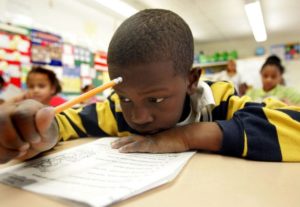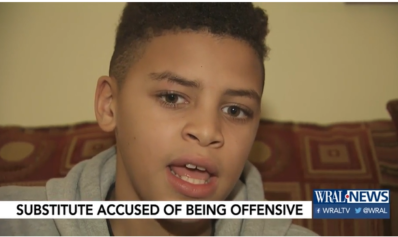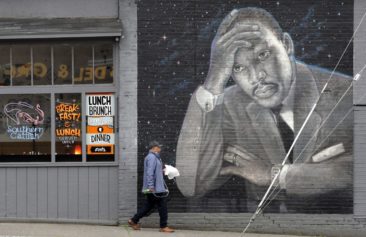
Author and educator Joseph Gibson writes, “Nobody (with better options) wants to teach Black kids, especially those from high-poverty backgrounds”
Those who argue the practice of racism is weakening, cite the reign of Barack Obama or the increased prominence of Black entertainers and African-Americans who’ve accumulated financial success and career accolades. It’s substantially more challenging to find optimism in the academic achievements of Black boys and girls.
A 2015 study found that racial disparities in school readiness, “in terms of math, reading, and behavior,” are improving for all groups of children, “except for Black kids.” A year later, USA Today reported that Black children “are nearly four times as likely as their white classmates to be suspended from school.” An investigation from the same year, titled “Given Half The Chance,” announced grimly that, “The 47 percent national graduation rate for Black males is nearly 28 percentage points lower than that for white males. In 10 states, the report said the graduation rate gap exceeds 30 percentage points.”
To be “young, gifted, and Black” remains a dire proposition for Black children.
Given the dismal report card on the progress of African-American students, finger pointing and blame-assignment is perpetual, and Black parents are often the targets. The award-winning author of “Medical Apartheid” Harriet A. Washington blasts the racist tradition of demonizing “Black parents, particularly mothers, as medically and behaviorally unfit.” The conviction that Black mothers and fathers are defective motivated William Shockley, a Nobel Prize winner, to suggest that Black mothers be sterilized to prevent birthing a new generation of thugs. Even former President Obama, at the time a U.S. senator and presidential hopeful, once castigated Black mothers and fathers for feeding their children “cold Popeye’s” fried chicken.
Notwithstanding the negativity heaped upon Black parents, the future of Black sustainability hinges on quality Black parents raising Black boys and girls brimming with self-esteem and prepared for life challenges, including the racial terrorism targeting them. General and child psychiatrist Dr. Frances Cress Welsing implored Black people to recognize that uncared for Black children can become helpless victims. “When you play around with sex, the joke is on the offspring,” is a saying the late physician passionately repeated because she saw Black children as a priceless investment in the future of Black people. Counseling youth for a half century, she saw the lifelong consequences of children who endured racism as well as substandard parenting.
The tendency to heap non-constructive scorn on Black parents fails to obscure years of coordinated effort to deny Black boys and girls quality education.
USA Today reported Black high school students are more likely to attend to schools that don’t offer Algebra II, calculus, chemistry, or physics. In addition to being more often denied advanced courses, Black students “are also more likely to have inexperienced teachers.” Black mothers and fathers are infrequently the deciding vote and are routinely excluded when decisions are made about which instructors are in their children’s classrooms or which classes are taught.
Although many impediments to Black academic success are beyond the control of Black parents, this does not mean we have no room for improvement. Educator and founder of KITABU publishing, Joseph Gibson points to one of Dr. Martin Luther King, Jr.’s less popular remarks: “We must not let the fact that we are victims of injustice lull us into abrogating responsibility for our own lives. We must not use our oppression as an excuse for mediocrity and laziness.”
Gibson’s new book, “Why Nobody Wants to Work with Black Kids from High Poverty Backgrounds,” offers a wealth of suggestions on how Black parents can fine tune their own behavior to help support their child’s educational growth. Acknowledging that untold generations of Black people have endured trauma and frustration in school systems operated by white educators who despised the Black pupils they were charged to educate, Gibson recognizes many parents harbor painful classroom memories that make it challenging to nourish their child’s education. Additionally, the violence of racism that imperils mothers’ and fathers’ ability to reliably provide for their children, convinces too many Black parents that regardless of their best efforts, racism will devour their children. Gibson posits this confluence of trauma leads many Black parents to “self-handicapping behaviors.”
“Not facilitating homework completion, not limiting academically unproductive activities, not constructively communicating with teachers… and not encouraging consistent effort and resilience,” are just a few of the behaviors Gibson asks Black parents to eliminate. There are a myriad of obstacles to the success of Black students, Black parents should make sure that our habits and/or fears are not one of the things blocking are child’s learning.
Watching generations of Black children flushed through the school to prison pipeline can deflate a parent’s motivation and convince some that investment in school is worthless pursuit. But it’s imperative Black parents reject this thinking and demand and model a lifelong pursuit of knowledge. Classrooms have been operated in a manner that devalues the lives and intellectual capacity of Black boys and girls. This should motivate and sternly challenge Black mothers and fathers to cultivate Black scholars in spite of these barriers.
——————————————————————————————————Gus T. Renegade hosts “The Context of White Supremacy” radio program, a platform designed to dissect and counter racism. For nearly a decade, he has interviewed and studied authors, filmmakers and scholars from around the globe.


